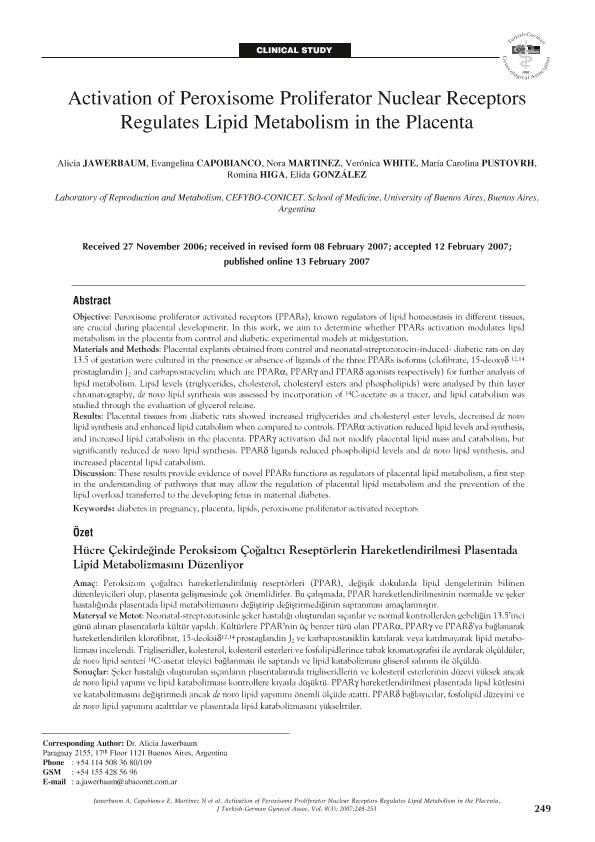Artículo
Activation of peroxisome proliferator nuclear receptors regulates lipid metabolism in the placenta
Jawerbaum, Alicia Sandra ; Capobianco, Evangelina Lorena
; Capobianco, Evangelina Lorena ; Martinez, Nora Alicia
; Martinez, Nora Alicia ; White, Verónica
; White, Verónica ; Pustovrh, María Carolina
; Pustovrh, María Carolina ; Higa, Romina Daniela
; Higa, Romina Daniela ; Gonzalez, Élida Teresa
; Gonzalez, Élida Teresa
 ; Capobianco, Evangelina Lorena
; Capobianco, Evangelina Lorena ; Martinez, Nora Alicia
; Martinez, Nora Alicia ; White, Verónica
; White, Verónica ; Pustovrh, María Carolina
; Pustovrh, María Carolina ; Higa, Romina Daniela
; Higa, Romina Daniela ; Gonzalez, Élida Teresa
; Gonzalez, Élida Teresa
Fecha de publicación:
09/2007
Editorial:
Galenos Yayincilik
Revista:
Journal of the Turkish-German Gynecological Association
ISSN:
1309-0399
e-ISSN:
1309-0380
Idioma:
Inglés
Tipo de recurso:
Artículo publicado
Clasificación temática:
Resumen
OBJECTIVE: Peroxisome proliferator activated receptors (PPARs), known regulators of lipid homeostasis in different tissues, are crucial during placental development. In this work we aim to determine whether PPARs activation modulates lipid metabolism in the placenta from control and diabetic experimental models at midgestation. MATERIALS-METHODS: Placental explants obtained from control and neonatal-streptozotocin-induced- diabetic rats on day 13.5 of gestation were cultured in the presence or absence of ligands of the three PPARs isoforms (clofibrate, 15deoxydelta12,14prostaglandin J2 and carbaprostacyclin; which are PPARα, PPARγ and PPARδ agonists respectively) for further analysis of lipid metabolism. Lipid levels (triglycerides, cholesterol, cholesteryl esters and phospholipids) were analysed by thin layer chromatography, de novo lipid synthesis was assessed by incorporation of 14C-acetate as a tracer, and lipid catabolism was studied through the evaluation of glycerol release. RESULTS: Placental tissues from diabetic rats showed increased triglycerides and cholesteryl ester levels, decreased de novo lipid synthesis and enhanced lipid catabolism when compared to controls. PPARα activation reduced lipid levels and synthesis, and increased lipid catabolism in the placenta. PPARγ activation did not modify placental lipid mass and catabolism, but significantly reduced de novo lipid synthesis. PPARδ ligands reduced phospholipid levels and de novo lipid synthesis, and increased placental lipid catabolism. CONCLUSIONS: These results provide evidence of novel PPARs functions as regulators of placental lipid metabolism, a first step in the understanding of pathways that may allow the regulation of placental lipid metabolism and the prevention of the lipid overload transferred to the developing fetus in maternal diabetes.
Palabras clave:
Diabetes
,
Placenta
,
Ppars
,
Lipids
Archivos asociados
Licencia
Identificadores
Colecciones
Articulos(CEFYBO)
Articulos de CENTRO DE ESTUDIOS FARMACOLOGICOS Y BOTANICOS
Articulos de CENTRO DE ESTUDIOS FARMACOLOGICOS Y BOTANICOS
Citación
Jawerbaum, Alicia Sandra; Capobianco, Evangelina Lorena; Martinez, Nora Alicia; White, Verónica; Pustovrh, María Carolina; et al.; Activation of peroxisome proliferator nuclear receptors regulates lipid metabolism in the placenta; Galenos Yayincilik; Journal of the Turkish-German Gynecological Association; 8; 3; 9-2007; 249-253
Compartir



